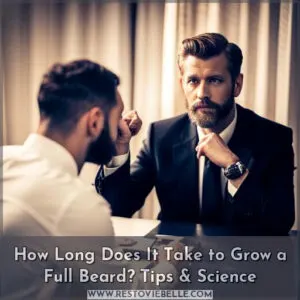This site is supported by our readers. We may earn a commission, at no cost to you, if you purchase through links.
Do you wonder if biotin can be useful to stimulate beard hair growth? This article will give a breakdown of the scientific understanding of the very popular hair supplement biotin and its impact on facial hair.
You will learn how the biotin will help you create a beard, strengthen hair, improve skin health, and potentially minimize hair loss. We will look at dosing, when to take the supplement, comparing natural sources of biotin to supplement forms, and touch on which people will benefit the most.
You will now be able to master the ins and outs of Biotin for a fuller, healthier beard.
Table Of Contents
- Key Takeaways
- Does Biotin Help Beard Growth?
- Does Biotin Support Beard Growth?
- Biotin’s Role in Strengthening Beard Hair
- Impact of Biotin on Skin Health and Beard Growth
- How Biotin May Promote Beard Growth
- Timeframe for Biotin’s Effects on Facial Hair
- Biotin Dosage and Timing for Optimal Beard Growth
- Biotin Supplements Vs. Natural Sources for Beard Growth
- Identifying Individuals at Risk of Biotin Deficiency
- Frequently Asked Questions (FAQs)
- Is biotin good for beard grow?
- Which vitamin is best for beard growth?
- What promotes beard growth?
- How long does it take for biotin to work for facial hair?
- Can biotin affect lab test results Are there side effects of biotin?
- What foods are high in biotin?
- How should I store biotin supplements?
- Can biotin interact with medications?
- Conclusion
Key Takeaways
- Biotin can be a helpful tool for beard enthusiasts, but it’s not a magic wand. It can support beard growth, but results vary, and it’s important to have realistic expectations.
- Biotin works by helping to strengthen beard hair and promote healthy skin. This can lead to a fuller, healthier beard.
- The recommended dosage of biotin for beard growth is 5,000 to 10,000 mcg per day. It’s important to take biotin at the same time each day to maintain stable levels in the body.
- Biotin can be found in both supplements and natural sources. Supplements are convenient, but natural sources like eggs, salmon, and beef liver provide biotin along with other important nutrients.
Does Biotin Help Beard Growth?
Yes, biotin by itself can work to promote beard growth. Biotin is a vitamin that makes beard hair thicker and stronger due to increased production of keratin.
This vitamin also supports your skin health, which aids metabolism and gene expression, providing an excellent environment for the development of hair follicles.
You will notice slight changes in the texture of your hair after 1-2 months and real thickness improvement after 5 to 6 months.
Take 5,000-10,000 mcg of biotin per day for optimal results and be vigilant about signs of deficiency such as thinning hair. If you want to maximize these benefits, there’s more to uncover.
Does Biotin Support Beard Growth?

You might’ve heard of biotin, which is supposed to enhance beard growth. But does it really work? Yes, biotin is an important vitamin for hair health. However, the ingredient has a minimal scientific connection to beard growth in particular.
This compound can work for you if your body can digest it well after food or supplements. Some users do face adverse side effects as well.
Alternative sources of biotin can easily be found in foods like eggs and nuts. This could enhance strength of hair and increase thickness in a similar regard, but additional research is warranted.
If you’re anxious to take biotin supplements for your beard, then you should especially keep in mind that results may vary, particularly if you’re not suffering from a biotin deficiency.
Biotin’s Role in Strengthening Beard Hair
Biotin helps to strengthen beard hair. This B-vitamin is generally an indispensable player in the formation of keratin, which strengthens the protein structure of your facial hair.
When you consume enough biotin through supplements or diet, you give your beard the building blocks it will need to grow thicker and stronger. While length is important, what matters is that biotin can improve the quality of your beard.
More specifically, it increases the durability of the beard hair against breakage or any form of environmental damage. Results may vary, but optimizing levels for sufficient intake of biotin is literally a no-brainer if you’re looking to level up in the world of beards.
Impact of Biotin on Skin Health and Beard Growth
Biotin may, therefore, influence beard growth indirectly through its effects on skin health by creating a much more conducive environment for the hair follicles.
Genetic predisposition unites with exogenous and endogenous factors in balance to cause androgenetic alopecia. That said, it can be assumed that biotin supplementation supports regeneration of the skin cells and thus keeps the sebum production at a level unlikely to interfere or even minimize the risk—fostering optimal beard growth—of hair loss.
Healthy Skin
Healthy skin is a big factor in having the best possible beard growth. The main role of biotin, also known as vitamin B7, is to maintain healthy skin through metabolism and gene expression. It assists enzymes in very vital chemical reactions that keep your skin strong and nourished.
With this boost in the health of your skin, biotin efficiently places you in an environment where facial hair can thrive unchecked. Think of your skin as the fertile soil of your beard; the healthier your ground, the better your beard’s going to grow. This effect can be further enhanced with biotin supplements or foods rich in biotin for a fuller and more robust beard.
Minimizing the Risk of Hair Loss
Minimizing the risk of hair loss is important for beard growth, especially if you’ve experienced thinning hair. Biotin plays a pivotal role here. A lack of biotin can exacerbate hair loss, particularly in conjunction with factors like testosterone fluctuations.
While biotin deficiency is rare, conditions like consuming raw egg whites can hinder its absorption. Integrating biotin, whether through diet or supplements, may improve hair health.
Though products like minoxidil and finasteride are known for combating hair loss, biotin might enhance their effectiveness by fortifying hair against breakage, supporting overall skin health, and ensuring you have a fuller, healthier beard.
How Biotin May Promote Beard Growth
Biotin enhances beard growth in a number of ways: First, it makes keratin, which is the protein that strengthens the hair. It promotes cell regeneration; areas with this kind of cell growth include those responsible for growing healthy beard hair. Lastly, taking biotin will give you a better beard by giving you thicker hair and ensuring it doesn’t break easily. Ways through which biotin does this are three:
- Keratin production: Increases hair strength.
- Cell regeneration: References healthy hair growth.
- Beard health: Enhances thickness of hair, reducing breakage.
These all combine in such a way to possibly support a fuller, healthier beard.
Timeframe for Biotin’s Effects on Facial Hair
You will need to be pretty patient in order to see results from biotin for beard growth. In most cases, individual improvements can be realized from 3 to 6 months. Results vary keeping in mind the occurrence of biotin deficiency and personal response, so follow-up happens consistently.
| Timeframe | Expected Results | Criteria |
|---|---|---|
| 1-2 Months | Very minor changes | Slight hair texture change |
| See | 3-4 Months | Noticeable improvement; increased hair thickness. |
Biotin Dosage and Timing for Optimal Beard Growth
For beard growth, recommended overdoses of biotin would be from 5,000 to 10,000 mcg per day. It’s also important in maintaining healthy levels of keratin and hair.
If possible, take your supplement with biotin at the same time each day. It helps in maintaining stable levels of the compound within the organism.
Lastly, watch out for signs of biotin deficiency, including thinning of hair, skin problems, and brittle nails. While taking such supplements is generally safe, it’s always important to consult a professional before beginning.
Biotin Supplements Vs. Natural Sources for Beard Growth
The choice between biotin supplements and natural sources will have to be based on considerations such as bioavailability and long-term effects.
Obviously, supplements have clear dosage and are convenient, but they can never match the nutrient synergy found in whole foods. Egg, salmon, and beef liver provide biotin with other important nutrients, thereby enhancing the bioavailability of biotin.
Regular dietary consumption will ensure that you get a balanced array of vitamin and mineral intake for overall health.
If you’re going to take supplements, keep tabs on the dosage, and consult a healthcare professional to take precautionary measures against possible interactions.
Identifying Individuals at Risk of Biotin Deficiency
You might be at risk of biotin deficiency if you consume excessive raw egg whites, have alcohol use disorder, take certain anticonvulsant medications, or suffer from gastrointestinal issues.
Deficiency symptoms include thinning hair, brittle nails, and skin rashes. To diagnose the deficiency, doctors usually perform blood or urine tests.
Treatment involves biotin supplements, while prevention includes a balanced diet with biotin-rich foods like eggs, nuts, and seeds.
Ensuring adequate intake can support healthy skin and hair, promoting overall wellness.
Frequently Asked Questions (FAQs)
Is biotin good for beard grow?
Biotin may enhance beard growth, but evidence is limited. It supports keratin production, potentially strengthening and thickening hair. Results vary; most benefits are seen in those with biotin deficiency. Always consult your healthcare provider.
Which vitamin is best for beard growth?
Biotin is the best vitamin to grow your beard. It increases hair follicles, allowing an increase in keratin production and growing thicker, fuller facial hair. Just remember not to take more than 5,000-10,000 mcg per day for optimal results.
What promotes beard growth?
You can promote beard growth by maintaining a healthy diet rich in vitamins and minerals, managing stress, getting adequate sleep, exercising regularly, and using quality beard care products like oils and conditioners.
How long does it take for biotin to work for facial hair?
Biotin can take about 3-6 to show results for facial hair growth. Keep in mind, individual results may vary, and if you don’t see improvements after six months, consult a healthcare professional.
Can biotin affect lab test results Are there side effects of biotin?
Biotin may interfere with lab tests, leading to false results for hormone and vitamin D levels. Consult your doctor before taking biotin supplements to avoid any unintended consequences. Excess biotin is simply flushed out through your urine.
What foods are high in biotin?
You can boost your biotin intake with foods beef liver, eggs, salmon, and milk. Nuts, seeds, and legumes are also great sources, ensuring you maintain healthy skin, hair, and nails.
How should I store biotin supplements?
Keep biotin supplements in a cool and dry place, away from direct sunlight and moisture. Always store them in an absolutely original container with an absolutely tight seal to maintain effectiveness and safety.
Can biotin interact with medications?
Yes, biotin does interact with some medications, such as anticonvulsants, upon simultaneous administration. Consult your doctor before taking any biotin supplement, mainly in a case where you’re on prescription drugs. This will ensure safety and avoid potential interactions.
Conclusion
Like a silver bullet for beard enthusiasts, bi supplements can indeed support your journey to a fuller, healthier beard. Evidence suggests biotin helps strengthen beard hair and promotes healthy skin, reducing the risk of hair loss.
By understanding the correct dosage, timing, and the value of both supplements and natural sources, you can effectively incorporate biotin into your routine.











